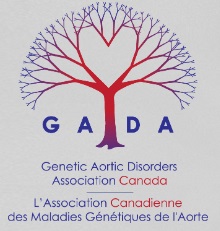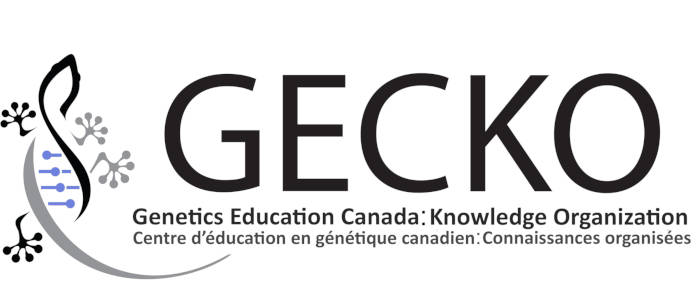Evidence-based educational resources for healthcare providers on cardiogenomic topics.
Bicuspid Aortic Valve
Point of care tool: 1-page, features genetic considerations when assessing bicuspid aortic valve. (October 2025)
GECKO on the run: A 4-page, evidence-based summary for healthcare practitioners. Features a bottom line, pathophysiology, genetics of BAV, family screening, pregnancy and references. (October 2025)
Factor V Leiden
Point of care tool: Contains when to offer genetic testing, when to consider genetic testing and when genetic testing is not indicated. (June 2025)
GECKO on the run: A 4-page, evidence-based summary for healthcare practitioners. Features a bottom line, red flags to consider genomic consultation or testing, surveillance and management recommendations. (June 2025)
Familial hypercholesterolemia
Point of care tool: A toolkit containing point of care information on diagnosis, genetic testing and management of familial hypercholesterolemia. (March 2024)
GECKO on the run: A 4-page, evidence-based summary for healthcare practitioners. Features a bottom line, clinical features, Canadian diagnostic criteria, surveillance and management recommendations. (March 2024)
GECKO deep dive: An 9-page, comprehensive evidence-based resource for healthcare practitioners. Features a bottom line, clinical features, diagnostic criteria, surveillance and management, references and more. (Feb 2024)
Point of care tool: 1-page, features a bottom line and criteria for genetic assessment. (July 2024)
GECKO on the run: A 2-page, evidence-based summary for healthcare practitioners. Features a bottom line, clinical features, criteria for genetic assessment, possible genetic results, surveillance and management. (July 2024)
GECKO deep dive: A 6-page, comprehensive evidence-based resource for healthcare practitioners. Features a bottom line, clinical features, criteria for genetic assessment, benefits and limitations of genetic testing and possible results, surveillance and management, references and more. (July 2024)
Hypertrophic cardiomyopathy
Point of care tool: A tool to be used at the point of care summarizing hypertrophic cardiomyopathy (HCM) presentation and management and highlights who should be offered genetic testing and the benefits of genetic testing for HCM. (Oct 2024)
GECKO on the run: A 3-page, evidence-based summary for healthcare practitioners. Features a bottom line, who to offere genetic testing to, benefits of genetic testing and more. (Oct 2024)
GECKO Deep Dive: An 8-page evidence based summary for healthcare practitioners. Features a bottom line, presentation and management of HCM, who to offer genetic tesing to and the benefits of genetic testing, tips for HCM screening, references, resources and more. (Oct 2024)
Long QT syndrome
GECKO on the run: A 3-page, evidence-based summary for healthcare providers. Features a bottom line, QTc cut-offs, red flags to consider genetic or cardiac consultation, benefits and limitations of genetic testing, surveillance and management, references and more. (Aug 2016; under review)
Point of care tool: Contains a brief overview of long QT syndrome and the red flags for how to identify the condition and the individuals who would most likely to benefit from referral to genetics and a cardiac arrhythmia specialist. (Oct 2016; under review)
Resources
Specialized Lipid Centres (courtesy of FH Canada)
Genetic Aortic Disorders Canadian clinics (courtesy of Genetic Aortic Disorders Association Canada)
The Ehlers-Danlos Society is a global community of individuals, caregivers, healthcare professionals, and supporters, dedicated to saving and improving the lives of those affected by the Ehlers-Danlos syndromes (EDS), hypermobility spectrum disorders (HSD), and related conditions.
https://www.ehlers-danlos.com/
 Canadian Sudden Arrhythmia Death Syndromes (SADS) Foundation
Canadian Sudden Arrhythmia Death Syndromes (SADS) Foundation
SADS refers to a variety of cardiac arrhythmia disorders which are often genetic and can be responsible for sudden death in young, apparently healthy people. Canadian Sudden Arrhythmia Death Syndromes (SADS) Foundation, a registered Canadian charity, is a patient advocacy group in Canada dedicated to supporting families affected by inherited cardiac rhythm disorders.
https://www.sads.ca/
 Hearts in Rhthym Organization (HiRO)
Hearts in Rhthym Organization (HiRO)
The Hearts in Rhythm Organization (HiRO; pronounced hero) is a network of individuals dedicated to improving awareness and understanding of inherited cardiac conditions, standardizing care in Canada and preventing the tragedy of sudden cardiac death. Founded by Dr. Andrew Krahn in 2016, we started as a grassroots community of like-minded clinicians wanting to make a difference for Canadians affected by unexplained sudden cardiac arrest (SCA), and have grown into an organization that includes researchers, healthcare providers, family members and patients.
 FH Canada Familial Hypercholesterolemia
FH Canada Familial Hypercholesterolemia
Canadian FH Registry is to bring together a multi-disciplinary group of physicians, basic and clinical researchers to improve the delivery of care to patients with severe lipoprotein disorders, especially FH, and to foster collaborative research.
https://fhcanada.net/
 Genetic Aortic Disorders Association of Canada (formerly the Canadian Marfan Association)
Genetic Aortic Disorders Association of Canada (formerly the Canadian Marfan Association)



